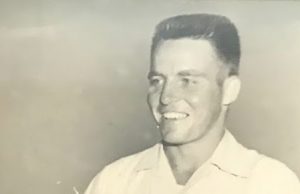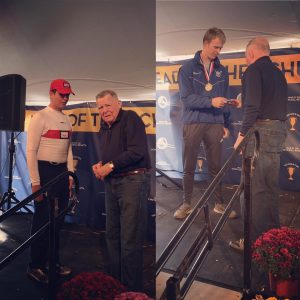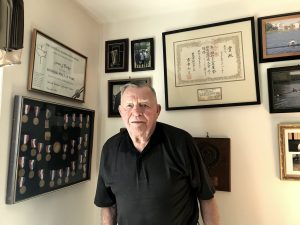Where to start a story about Jim Barker? Back in 1948 when he was national singles champion –just the first of his 24 national championships? His 42 years coaching at the Haverford School? The many young athletes he nurtured, particularly as single scullers, with some coming to Philadelphia just to train with him – and then settle here? His election to the National Rowing Hall of Fame? That the Haverford School named their boathouse for him and
the HOSR has an annual race in his honor?
But what many people don’t know is how Jim, with his quiet but steely determination, helped push the social changes that swept through Boathouse Row starting in the 1950s and continuing into the 1970s. That was a time of upheaval on the Row when a handful of Jews, African-Americans, and, finally, women gained admission to the all-male, largely white boat clubs.

Jim, who as a Catholic says he felt like a minority when he joined the Undine Barge Club in 1947, invited Ed Pressman to join in the 1950s, not realizing there might be pushback. Some members questioned his choice, to which he responded, “I proposed him for membership and I’m sticking with it.”
“So that’s how the first Jew got into the club,” he said. “I didn’t do it as a campaigner or anything like that. He was a friend of mine.”
In the 1960s, he encouraged Undine to accept John Izzard. The club’s first African American was quickly voted in, but Jim worried whether he would feel accepted and coached him about it.
“I could imagine if I was the first white person in the club, you know you’re being looked at and I just told John, who is a very personable guy, ‘Just go ahead and be John Izzard and people will take you for what you are. And that’s the way it happened. He was there and it never was an issue.”
Also in the 1960s, at a time when the only club on Boathouse Row with women was the Philadelphia Girls Rowing Club, he went out of his way to give pointers to women such as Joanne Wright Iverson, who later founded the National Women’s Rowing Association and pushed for women’s rowing to become an Olympic sport. He also pushed Undine to admit women.
Looking back, Jim says he never saw himself as an advocate of diversity. It was all about his family’s values and the community in which he grew up. “I never had an objection to a girl, a Jew, a black guy. I went to the Robert Morris grammar school, with black kids at that time. They just didn’t seem that different to me.”
 In ways large and small, Jim also helped shape rowing nationally and internationally, according to Jim Dietz, champion single sculler and long time head coach of the University of Massachusetts women’s rowing team. In the 1960s, Dietz said, “there were very few clubs in the United States that really specialized in sculling excellence on a major scale….It was Jim Barker at Undine, Malta and the New York AC under the tutelage of Jack Sulger that were predominantly filling the sculling spots winning at the National Championships and representing the USA at International competitions. These clubs were recognized as the places to go if you were a sculler but more important, they were places that created great scullers from scratch. People knew that they would be successful if they followed Barker’s direction. He was a proven winner!”
In ways large and small, Jim also helped shape rowing nationally and internationally, according to Jim Dietz, champion single sculler and long time head coach of the University of Massachusetts women’s rowing team. In the 1960s, Dietz said, “there were very few clubs in the United States that really specialized in sculling excellence on a major scale….It was Jim Barker at Undine, Malta and the New York AC under the tutelage of Jack Sulger that were predominantly filling the sculling spots winning at the National Championships and representing the USA at International competitions. These clubs were recognized as the places to go if you were a sculler but more important, they were places that created great scullers from scratch. People knew that they would be successful if they followed Barker’s direction. He was a proven winner!”
Similarly, Dietz said, Jim was a force in bringing the quad (4x) into international competition, “first getting it as an exhibition event at the 1973 Worlds in Moscow, World event in Lucerne, Switzerland in ‘74 and finally an Olympic event in 1976 in Montreal.” Jim Barker also persuaded the Head of the Schuylkill to add youth singles, now one of the most prescribed youth events at the regatta.

Then there’s Jim’s role in the surprising story of how the Gold Cup– first awarded in the 1920s and mysteriously lost in the 1960s– was found again and now is raced on the Cooper River the same weekend as the HOSR.
Here’s how Jim tells the story: “A real good friend of mine, Joan Sholl, was walking downtown. She collected old medals and she looked in this antique store and there’s the Gold Cup sitting there [in a box of trophies]. The Gold Cup is solid gold…. How it got there is something for a detective to figure out.”
Around then, Jim was having dinner with Bill McNabb, CEO of Vanguard, who had originally come to Philadelphia from Dartmouth College to train with Jim; champion rower and physician Scot Fisher, whom he had coached years before when he was a student at the Haverford School; and Fisher’s father-in-law, Herb Lotman, founder of Keystone Foods who had just been approached to help keep the Dad Vail from moving to New Jersey.
As Jim tells it, he turns to Lotman, “And I say, ‘Why don’t you get involved with the Gold Cup?’ He says. ‘What the hell’s that?’ We told him . So he said, ‘Where is it?’ We told him this woman had it in her antique shop downtown. Apparently the Schuylkill Navy got involved first, which was bad news because they went down there sort of threatening… She was a smart cookie and she threw them out of the store. Herb apparently went down and, of course,
him being Jewish and the woman being Jewish, there were a little more mutual grounds there.”
Then at dinner one night, “the phone rings and it was Herb Lotman. He says, ‘Hey, Barker’ – he always called me Barker – ‘I’m driving up the expressway right now and I’ve got the Gold Cup sitting in my lap. What the hell do we do with it now?’”
“That’s how we got the Gold Cup.”
–Dotty Brown, author of “Boathouse Row: Waves of Change in the Birthplace of American Rowing.”
View the recording of the December 2nd ‘Story Hour’ with guest of honor, Jim Barker, and friends.
